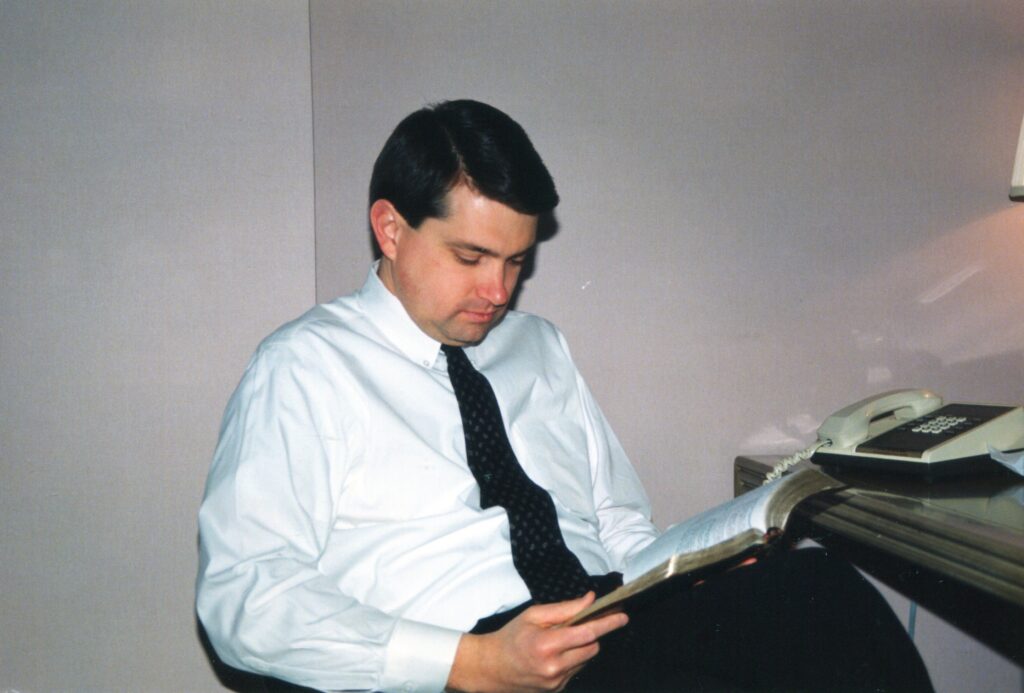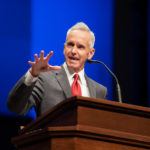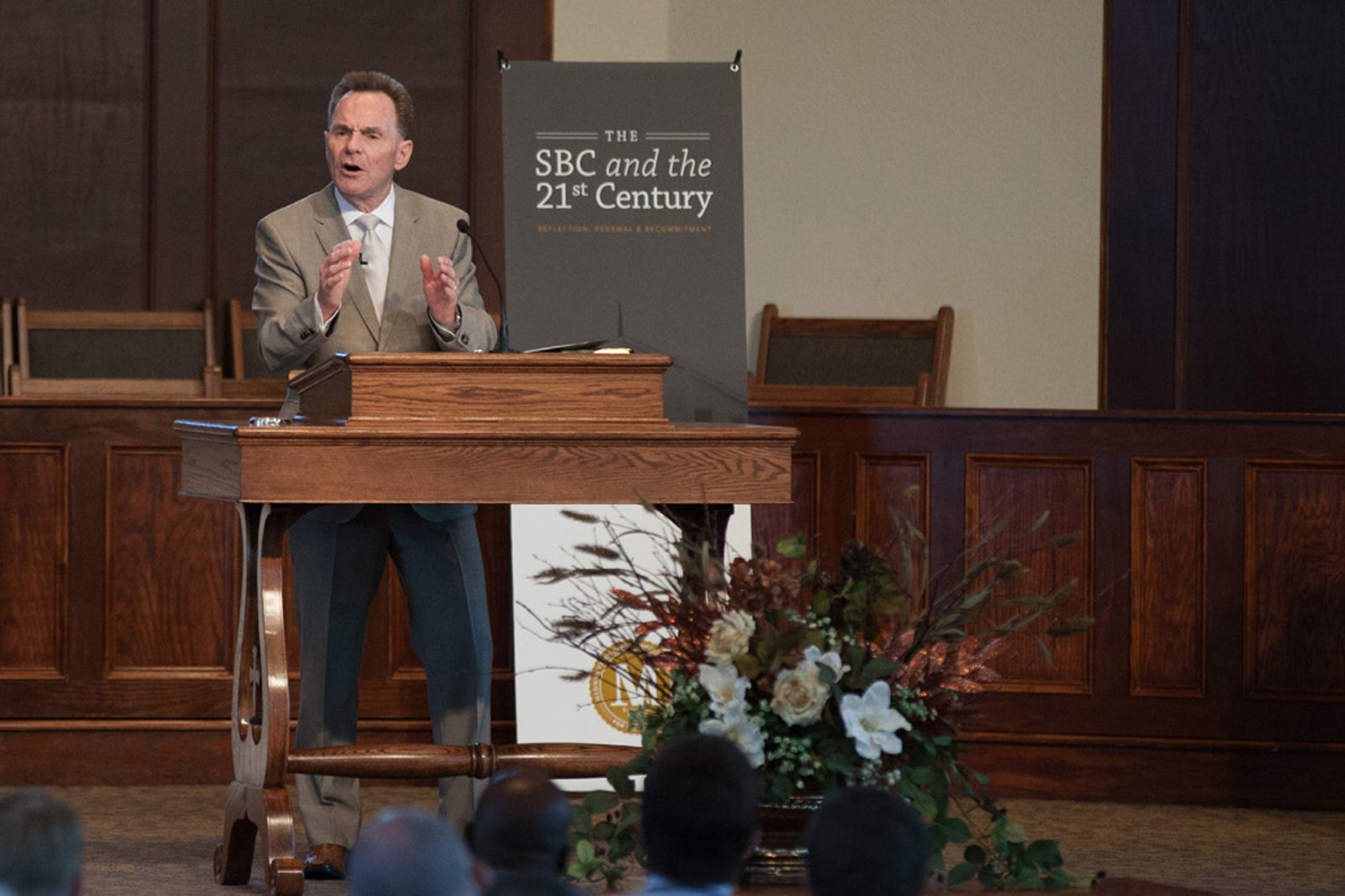
WASHINGTON (BP) – When God called a young sportswriter named Tom Strode to ministry 40 years ago, Strode thought that meant leaving journalism forever. But God had other plans.
After serving several years on staff at Bellevue Baptist Church in Memphis, Tenn., Strode became Washington bureau chief for Baptist Press. Thirty-two years later, he’s still the Washington bureau chief, a position from which he retired at the end of March (though his byline may still appear occasionally for a few more weeks). Under his byline are thousands of articles on the public policy issues that matter most to Southern Baptists. Not bad for a man who thought he was leaving journalism.

Strode “gave a backbone of integrity to Baptist Press that distinguished it in both the denominational and secular media contexts,” said Art Toalston, who served 23 years as BP editor. “He reported with clarity on the sanctity of life, bioethics, religious liberty and other public affairs concerns relevant to Southern Baptists. Yet his stories uniquely included a few succinct paragraphs for Baptists’ awareness of opposing points of view – and for their proponents to understand that Baptist Press, and thus Southern Baptists, had treated them with fairness and respect.
“Just as importantly, the high integrity of Tom’s reporting gave integrity to every other element of the daily content we set forth to our readers,” Toalston said. “It is not an overstatement to describe Tom as one of the greatest writers in the history of Baptist journalism.”
Strode’s interest in journalism started in high school. A self-described “sports fanatic,” he wrote about attending a college football game for an assignment in English class. The teacher was impressed and encouraged him to pursue sports writing.
So he did, earning a bachelor’s degree in 1974 from the University of Missouri’s journalism school, then joining the sports staff of the Arkansas Gazette in Little Rock. He was saved at age 23, eventually sensed a call to ministry and headed to Mid-America Baptist Theological Seminary in 1982, where he earned a master of divinity.
In seminary, he joined the Bellevue staff under pastor Adrian Rogers.
“It was a wonderful time as a family being members there, being under his preaching of the Word,” Strode said. Editing Bellevue’s church newsletter “kept me doing some writing and editing even though I wasn’t writing lengthy stories.”
That changed with a call from Richard Land, then-executive director of the SBC’s Christian Life Commission (CLC). The convention had voted to expand the CLC’s Washington presence, including a spot on the Commission’s staff for a BP Washington bureau chief. SBC leaders were wondering where to find someone both theologically conservative and journalistically skilled.
Land found the answer in Strode. He moved to the D.C. area with his wife Linda and two children, and the next 30 years were a whirlwind of activity as he worked for the CLC and its successor SBC entity the Ethics & Religious Liberty Commission (ERLC). Strode attended U.S. Supreme Court oral arguments, White House events, congressional hearings, Marches for Life and interviewed congressmen and issue advocates.
He was present at the confirmation hearings for Supreme Court Associate Justice Clarence Thomas and the bill signing when President George W. Bush enacted a ban on partial-birth abortion. He has been in the room with at least three U.S. presidents.
Barrett Duke, a former ERLC vice president who led the Washington office, called Strode “one of the finest men I have known.”
“His example of gracious faithfulness has influenced many Christian men and women working in D.C.,” said Duke, executive director of the Montana Southern Baptist Convention. “I could always count on Tom to search out the whole truth of an issue and to report it clearly. He may be retiring, but I hope we continue to see his byline. We need men like Tom more than ever. I wish him well as he finds God’s next calling.”
Strode’s commitment to his work was underscored by the nearly four-hour roundtrip commute he endured each day to the ERLC’s Washington office. He drove from his Fredericksburg, Va., home to the nearest commuter train station, then rode an hour and a half to the city.
On the train I would “read,” he said. “I could do some work on my laptop.” From 1998-2020, Strode pastored Covenant Community Church in Fredericksburg and would use some of his commute time for sermon preparation. In 2020 he moved to Nashville, though he retained the title of Washington bureau chief.
C. Ben Mitchell, a longtime ERLC bioethics consultant, called Strode “the consummate professional, walking that razor thin line between serving in a denominational news agency and reporting the facts to the best of his ability.”
“He is competent, adept and ethical, a giant of personal and professional integrity in every way,” Mitchell said. “His retirement is a great loss to Christian journalism.”
Strode’s career was punctuated by an event he never thought he would see: the overturning of the Supreme Court’s Roe v. Wade decision that effectively legalized abortion nationwide in 1973. When the Court struck down that ruling last year in Dobbs v. Jackson Women’s Health Organization, Strode was there to write about it.
“The Court had opportunities going back to the late 1980s where it looked like it might overturn Roe, and it had always failed to,” Strode said. “It became such a part of Supreme Court jurisprudence for so long and such a part of the country” that “it was hard to imagine” its overturning. “I didn’t know if it would be a reality while I was living.”
To honor Strode’s years of service, the ERLC in December presented him a framed copy of his story on the Dobbs ruling. Also in the frame was one of his first BP stories from 1990.
“It has been a privilege to work with skilled editors and writers at BP who have shown abundant grace, kindness and patience to me and in response to my shortcomings,” Strode said. “And the same is true of being able to work with exceptional colleagues at the ERLC.”
–30–





















